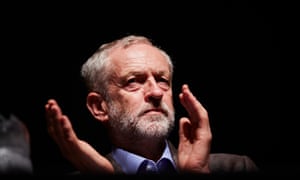For those of you claiming Corbyn's enonomic policies are not credible:
Jeremy Corbyn wins economists’ backing for anti-austerity policies
Former adviser to Bank of England among signatories to
letter dismissing criticism of economic plans, saying they are ‘not extreme’

More than 40 leading economists, including a former adviser to the Bank of England, have made public their support for Jeremy Corbyn’s policies, dismissing claims that they are extreme, in a major boost to the leftwinger’s campaign to be leader.
The intervention comes as the Corbyn campaign reveals that a Labour government led by the MP for Islington North would reserve the right to
renationalise Royal Bank of Scotland and other public assets, “with either no compensation or with any undervaluation deducted from any compensation for renationalisation” if they are sold at a knockdown price over the next five years.
The leftwinger’s economic policies – dubbed Corbynomics – have come under sustained attack in recent days, including by members of his own party, with
Andy Burnham warning his party in an interview with this paper not to forget the lessons of the general election about the importance of economic credibility.
But with just under three weeks until Ed Miliband’s replacement is announced, Corbyn’s credibility receives a welcome endorsement as 41 economists make public a letter defending his positions.
In the letter to which
David Blanchflower, a former member of the Bank of England’s monetary policy committee is a signatory, the economists write: “The accusation is widely made that Jeremy Corbyn and his supporters have moved to the extreme left on economic policy. But this is not supported by the candidate’s statements or policies. His opposition to austerity is actually mainstream economics, even backed by the conservative IMF. He aims to boost growth and prosperity.”
Corbyn remains the frontrunner to be Labour leader, but as his policies, and the risks he poses to the unity of the
Labour party, have come under scrutiny, rivals believe he is losing momentum.
Burnham’s campaign shared data with the Observer that suggested some of those who had previously committed to voting for Corbyn were now recognising the dangers and either opting for the shadow health secretary or describing themselves as “don’t knows”.
But writing in the Observer, Corbyn defended his platform and said the government’s “free market dogma” had to be fought and vowed that a Labour government under his leadership would re-empower the state. The chancellor, George Osborne, intends to
sell off £31bn of public assets in 2015-16.
Corbyn writes: “Parliament can feel like living in a time warp at the best of times, but this government is not just replaying 2010, but taking us back to 1979: ideologically committed to rolling back the state, attacking workers’ rights and trade union protection, selling off public assets, and extending the sell off to social housing.
“This agenda militates against everything the Chancellor says he wants to achieve. If you want to revive manufacturing and rebalance the economy, you need a strategic state leading the way.”
Burnham told the Observer that he feared the political consequences of going into a 2020 election on Corbyn’s platform. “Economic credibility is all and unless you have got that you haven’t got a basis for winning an election,” he said. “So Labour can’t unlearn that lesson three months away from the general election. That was the thing that told against us in the end and we have to be serious about that.”
In defence of the Corbyn camp’s plans to renationalise privatised industries, John McDonnell MP, who is the candidate’s campaign agent, said that privatisation had been “a confidence trick”. He said: “Privatisation over the last four decades has been a history of the British people being robbed and the spivs snatching up the public assets being given the licence to print money. From the earliest privatisations of water, energy and rail to the PFI schemes from the last decade, it has been one long confidence trick.


